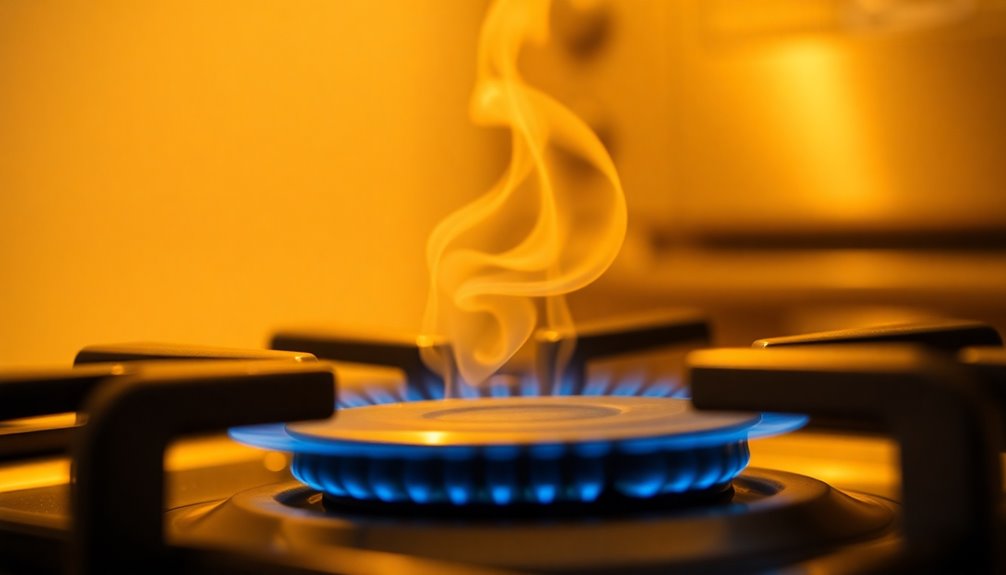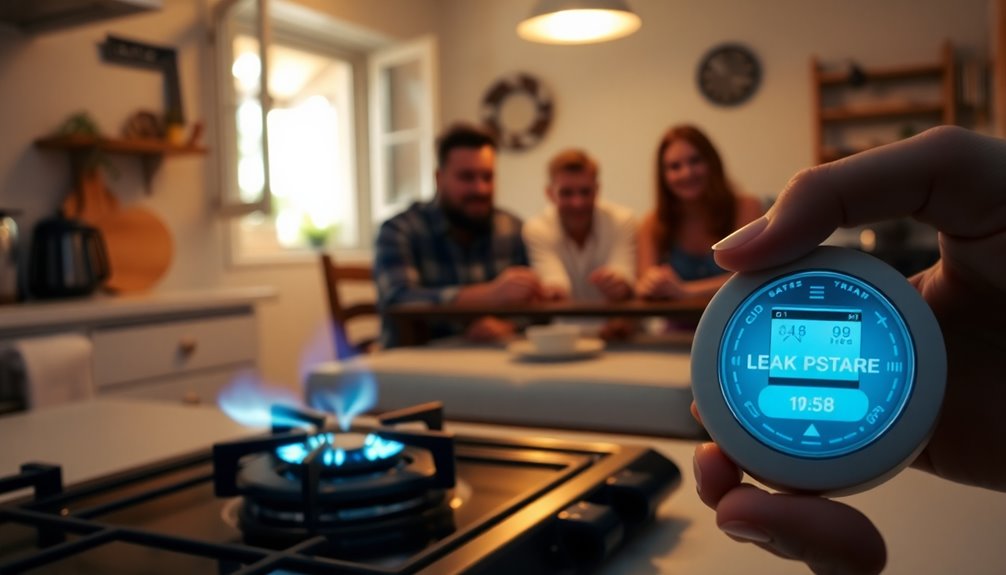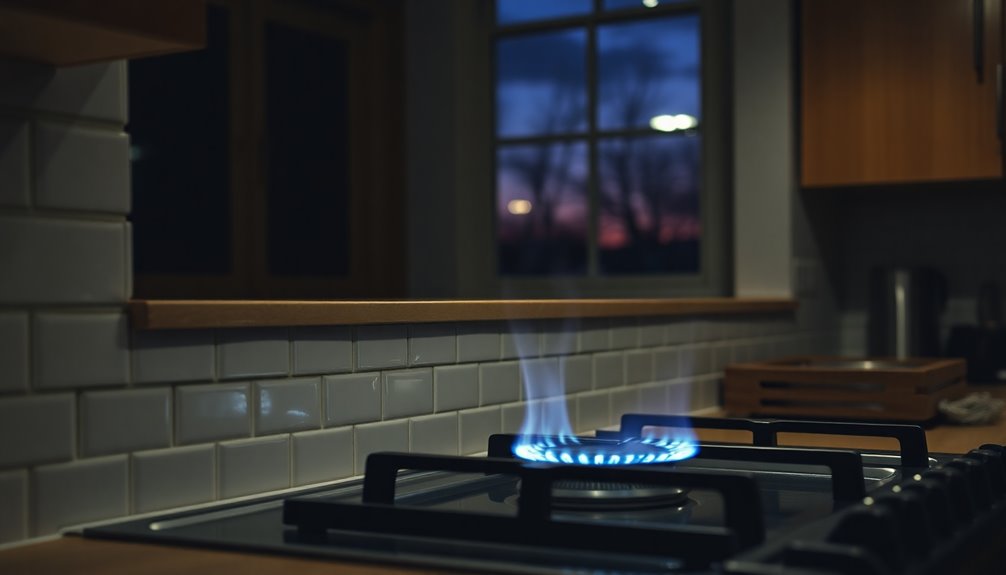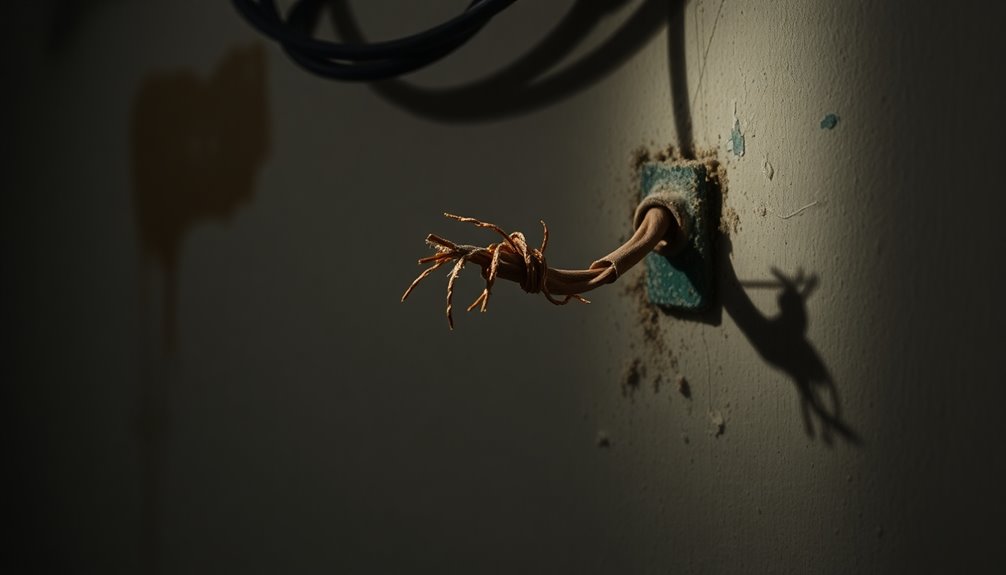If you smell natural gas in your house, it'll likely remind you of rotten eggs or sulfur. This distinct odor comes from mercaptan, which is added for safety. Natural gas itself is odorless, but mercaptan's strong scent helps you detect leaks early, as it can be sensed at extremely low levels. Keep in mind that not all gas leaks produce this odor, so it's essential to be vigilant. If you notice the smell, take it seriously and know what to do next. Discovering more about gas safety can help you stay prepared and protected.
Key Takeaways
- Natural gas is odorless in its pure form; a distinct odor is added for safety detection.
- The added odor resembles rotten eggs or sulfur, due to mercaptan.
- The scent of mercaptan can be detected at extremely low levels, as low as 1 part per billion.
- Signs of a gas leak include the rotten egg smell, hissing sounds, and unusual vegetation patterns.
- If you detect a gas smell, evacuate immediately and contact your local gas company for assistance.
Introduction

When you notice a strange smell in your home, it can be unsettling, especially if it resembles rotten eggs. This distinctive natural gas odor, caused by an added chemical called mercaptan, is a crucial safety feature designed to alert you to potential dangers. Natural gas itself is odorless, but that pungent scent acts as a warning for possible gas leaks. If you smell gas, take it seriously; it could indicate a dangerous situation.
In the event of a gas leak, your immediate response is vital. Evacuate the area without delay and contact emergency services to report the situation. It's important to avoid using any electrical devices or open flames, as these can ignite the gas, leading to catastrophic consequences.
Additionally, keep in mind that other unusual smells may signal problems with your gas appliances or plumbing systems. Regular maintenance of these appliances is essential for ensuring safety and minimizing risks. By being proactive and installing gas leak detectors, you can protect your home and loved ones from the dangers associated with natural gas smells.
Description of the Smell

Natural gas has a distinct smell that many describe as similar to rotten eggs or sulfur. This odor comes from a chemical called mercaptan, which is added for safety detection. In its pure form, natural gas is odorless, so this added scent is crucial for identifying a natural gas leak. You might notice that the smell is quite strong and unpleasant, often likened to sewage, making it easier to recognize a potential hazard in your home.
The odor threshold for mercaptan is incredibly low; you can detect it at concentrations as minimal as 1 part per billion (ppb). This means even a tiny leak can produce a noticeable smell, alerting you to possible gas leaks. However, keep in mind that not all gas leaks will emit this odor. Sometimes, if the gas mixes with other substances or if it's a larger leak, the smell might not be present. So, if you ever catch a whiff of that rotten egg odor, it's essential to take it seriously and check for a possible gas leak in your house. Your safety should always come first!
Source and Composition

How does natural gas get its distinct smell? In its natural state, natural gas is odorless, which can be dangerous. To ensure safety, an odorant called mercaptan is added, giving it a smell reminiscent of rotten eggs or sulfur. This strong odor allows you to detect a gas leak quickly; in fact, the odor threshold is reported at just 1 part per billion (ppb).
The composition of natural gas is primarily methane (CH4), which makes up about 70-90% of it. Alongside methane, you'll find other components like ethane, propane, and butane, but these typically don't contribute to the odor. The addition of mercaptan serves as a critical safety feature, alerting you to potential dangers in your home.
When you notice that strong, sulfurous smell, it's a warning sign that you need to take immediate action. Understanding the source and composition of natural gas helps you recognize its importance in your home while emphasizing the need for safety measures regarding gas leaks.
Typical Scenarios or Environments

Gas leaks can occur in various scenarios, and recognizing the typical environments where they might happen is vital for your safety. In your home, leaks often arise from faulty appliances, worn-out pipes, or improper installations. If you smell that distinct rotten egg odor, it's essential to act quickly. Evacuate the area immediately, as exposure could lead to natural gas poisoning.
Aside from natural gas leaks, be aware of the risks of a carbon monoxide leak, especially if you have gas appliances running without proper ventilation. Regular maintenance of your appliances can help prevent these dangerous situations and ensure Gas Safety.
Installing natural gas detectors throughout your home can help you detect natural gas early, alerting you to possible gas before it reaches hazardous levels. Additionally, knowing the location of your gas shutoff valve is crucial. In case of a leak, you can quickly turn off the gas supply.
Pay attention to the intensity of the odor, as humidity and concentration can affect how you perceive the smell. Being proactive in these typical scenarios can safeguard your home and loved ones from potential dangers.
Emotional or Cultural Associations

The unmistakable smell of rotten eggs can send chills down your spine, triggering an instinctive fear of danger in your home. This distinct odor, added to natural gas to signal leaks, stirs a deep-rooted reaction across many cultures. When you catch a whiff of that foul scent, it's easy to feel a wave of anxiety wash over you, as it represents a potential emergency that could threaten your safety and that of your loved ones.
The association of unpleasant odors with danger is a common cultural practice, reflecting a natural instinct to heed caution. You might recall safety drills or campaigns emphasizing the importance of recognizing this smell to prevent carbon monoxide exposure or gas-related incidents. The rotten egg odor is more than just a warning; it evokes an urgent emotional response, prompting immediate actions—like evacuating your home or calling for help.
This cultural understanding of the gas leak warning signal reinforces the importance of being aware of your surroundings. Whether you're at home or in public, recognizing this odor can save lives, making it an essential aspect of safety education in various communities.
Health or Safety Considerations

Recognizing that unmistakable rotten egg smell isn't just about heeding cultural warnings; it's also a critical health and safety measure. That odor indicates gas escaping, which can lead to serious health risks. If you catch a whiff, don't ignore it—immediate action is vital. Natural gas exposure can cause dizziness, respiratory issues, and even asphyxiation due to oxygen displacement.
Keep an eye out for signs of a gas leak, like dying plants or a hissing noise near your appliances. Equip your home with Carbon Monoxide Detectors to alert you to dangerous levels of carbon monoxide, a byproduct of incomplete combustion that can be deadly. If you detect that rotten egg smell, evacuate your home immediately and avoid creating a small spark, as this could ignite the gas.
Always report the incident to your utility companies, who are trained to handle such emergencies. Remember, high concentrations of natural gas can lead to explosions or fires, making swift action essential for your safety. Don't take chances—staying alert and prepared can save lives.
Final Thoughts

In light of the potential dangers associated with natural gas, being vigilant about its presence in your home is crucial. Natural gas itself is odorless, but the addition of mercaptan gives it a distinctive rotten egg smell, making it easier for you to detect a leak in your home. If you ever notice a strong sulfurous odor, evacuate immediately and call your utility company. They can assist in locating the source of the smell and ensure your safety.
You should regularly check your gas lines and appliances for any signs of wear or damage. If you suspect a leak, using soapy water to test connections can help identify any escaping gas bubbles. Remember, while the rotten egg smell is an important safety feature, it's essential to act quickly if you notice it suddenly appear. Regular maintenance and inspections not only keep your appliances functioning properly but also ensure that the mercaptan remains effective as a warning sign.
Stay informed and proactive about your natural gas supply, and always prioritize safety. Being aware of these signs can protect you and your loved ones from potential hazards.
Frequently Asked Questions
How Do I Know if I'm Smelling Natural Gas?
If you're wondering how to know if you're smelling natural gas, pay attention to any distinct odors. Natural gas is odorless, but an added scent makes it recognizable—often likened to rotten eggs or sulfur. If you notice this smell, or hear hissing noises near gas lines, take it seriously. Evacuate your home immediately and call emergency services. It's better to be safe than sorry when it comes to potential gas leaks.
What Smell Can Be Mistaken for Gas?
You might mistake several smells for natural gas. For instance, sulfur from decaying organic matter or certain foods like rotten eggs could confuse you. Additionally, plumbing issues might produce a sewage odor that resembles gas. Don't forget about burnt rubber or overheated electrical components, which can give off similar scents. It's essential to evaluate any suspicious smells immediately, as misidentifying them could lead to dangerous situations if there's an actual gas leak.
Is It Normal to Have a Slight Gas Smell in a House?
No, it's not normal to have any gas smell in your house, even a slight one. If you notice any odor resembling gas, you should take it seriously. It could indicate a leak, which requires immediate action. Evacuate your home and contact emergency services. Regularly inspect your gas appliances and lines, and consider installing natural gas detectors to ensure your safety and prevent potentially hazardous situations. Always prioritize your safety first!
What Smells Like Natural Gas but Isn't?
You might notice a few smells that resemble natural gas but aren't. Overripe food, like rotten eggs or certain cheeses, can give off similar odors. Volatile organic compounds from paint thinners or cleaning agents might also confuse your senses. If you've got plumbing issues, sewer gases can emit a sulfur-like scent too. Even fertilizers or pesticides can create smells that trick you into thinking there's a gas leak. Always investigate further to be safe!









